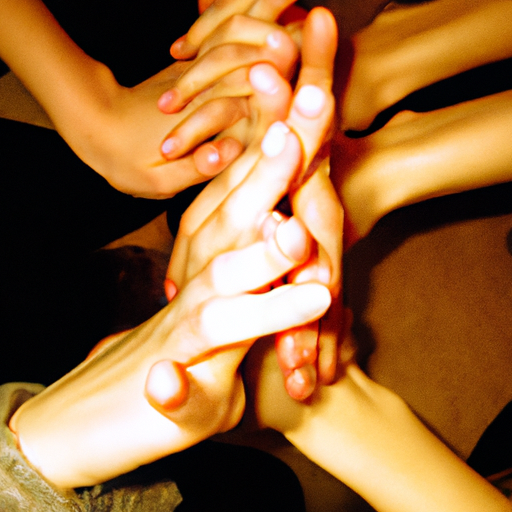
How Do I Handle Cultural Etiquette For Participating In Local Religious Ceremonies Or Rituals?
So you find yourself immersed in a new culture, eager to discover and embrace its rich traditions. Perhaps you’ve received an invitation to attend a local religious ceremony or ritual, but you’re unsure about the appropriate etiquette. Rest assured, navigating these unfamiliar customs can be done with grace and respect. In this article, we will explore some valuable tips and guidelines to help you handle cultural etiquette when participating in local religious ceremonies or rituals. Whether it’s attending a Hindu wedding, observing a Buddhist meditation session, or joining a Muslim prayer, you’ll gain the confidence and understanding to fully embrace these meaningful experiences without causing offense.
Understanding the Importance of Cultural Etiquette
Respecting local traditions and customs is crucial when participating in religious ceremonies or rituals in a foreign culture. By understanding and adhering to cultural etiquette, you not only show respect for the local community but also enhance your overall experience. Cultural etiquette involves observing and following specific rules, behaviors, and practices that are considered appropriate and respectful within a particular culture. It is essential to recognize that these customs vary across different societies and religions, so conducting thorough research and seeking guidance from local experts is essential.
Respecting Local Traditions and Customs
Respecting local traditions and customs is the foundation of cultural etiquette. Each culture has its unique set of customs and practices associated with religious ceremonies and rituals. These traditions may include specific rituals, prayers, attire, or dietary rules. By respecting and honoring these traditions, you demonstrate appreciation for the local culture and contribute to a harmonious and inclusive experience for all participants. It is important to approach local customs with an open mind and genuine curiosity, allowing yourself to fully immerse in the cultural experience.
Recognizing the Significance of Religious Ceremonies
Religious ceremonies hold deep meaning and significance for the local community. They play an essential role in their spiritual beliefs, cultural identity, and social cohesion. Recognizing and acknowledging the importance of these ceremonies is key to participating respectfully. By showing reverence and mindfulness during the rituals, you not only honor the beliefs of others but also create a more meaningful and authentic connection with the culture. Additionally, understanding the historical context in which these ceremonies developed can provide valuable insights into their purpose and symbolism, enriching your understanding and appreciation.
Researching the Local Culture and Religion
Before participating in any religious ceremony or ritual, it is vital to conduct thorough research on the local culture and religion. This research will help you understand the basic tenets of the religion, learn about the rituals and ceremonies involved, and explore the historical context in which they occur. By investing time and effort into researching the local culture and religion, you show your commitment to respecting and appreciating the traditions and customs of the community you are visiting.
Studying the Basic Tenets of the Religion
To better understand the local culture, it is essential to familiarize yourself with the basic tenets of the religion practiced in the community. This involves studying the fundamental beliefs, practices, and principles of the religion, as well as its historical foundations. By gaining insights into the religious worldview and values, you can approach the ceremonies and rituals with greater comprehension and sensitivity.
Learning about the Rituals and Ceremonies
Learning about the specific rituals and ceremonies that take place within the religion is crucial for active and respectful participation. This includes understanding the purpose of each ritual, its symbolism, and the proper sequence of events. Studying any prayers, chants, or hymns that may be recited during the ceremonies will allow you to follow along and engage in the ritual in a meaningful way. Additionally, being aware of any specific attire, gestures, or actions required during these rituals will help you adapt your behavior accordingly.
Exploring the Historical Context
Exploring the historical context in which the ceremonies and rituals originated can provide valuable insights into their significance and cultural evolution. Learning about the historical events, figures, and cultural influences that have shaped the religious practices will deepen your understanding and appreciation of the ceremonies. By understanding the roots of these traditions, you can engage with them in a more informed and respectful manner, honoring their historical and cultural importance.
Seeking Guidance from Local Experts
Seeking guidance from local experts is invaluable when participating in religious ceremonies or rituals in a foreign culture. They can offer invaluable insights, answer questions, and provide guidance on proper etiquette and behaviors. Consulting religious leaders or elders, engaging with cultural organizations or community groups, and attending educational workshops or classes are excellent ways to seek guidance and gain a deeper understanding of the culture and religion.
Consulting Religious Leaders or Elders
Religious leaders or elders are often the best sources of information when it comes to understanding and navigating religious ceremonies and rituals. They possess a wealth of knowledge and can guide you on the appropriate behavior, attire, and protocols to follow. By approaching them with respect and humility, you can develop a meaningful relationship and gain valuable insights that will enhance your cultural experience.
Engaging with Cultural Organizations or Community Groups
Cultural organizations or community groups dedicated to preserving and promoting the local culture can provide a wealth of information and guidance. They often organize events, workshops, or cultural exchanges that allow you to immerse yourself in the local traditions and interact with community members. By actively engaging with these organizations or groups, you can learn from their expertise, build relationships, and gain a deeper appreciation for the culture.
Attending Educational Workshops or Classes
Attending educational workshops or classes focused on the local culture, religion, or specific ceremonies and rituals can be immensely helpful. These sessions provide a structured and guided learning environment where you can ask questions, practice proper etiquette, and receive feedback. Workshops or classes may cover topics such as appropriate behavior, attire, gestures, or understanding the deeper meanings of the ceremonies. By actively participating in these educational opportunities, you can develop the necessary skills to engage respectfully and confidently in religious ceremonies.
Adapting Your Behavior and Dress
When participating in religious ceremonies or rituals in a foreign culture, adapting your behavior and dress to align with the customs of the local community is essential. This demonstrates your respect for their traditions and ensures a more inclusive and meaningful experience for all participants. Modesty, appropriate attire, observing gender segregation rules, and practicing proper behavior and body language are key considerations when adapting to the cultural expectations.
Modesty and Appropriate Attire
In many religious ceremonies, modesty in attire is highly valued and expected. It is crucial to dress appropriately by covering shoulders, chest, and legs, as required by the culture and religion. Avoid wearing revealing or provocative clothing, as it may be considered disrespectful or offensive. Women may be required to wear head coverings or veils, while men may need to wear specific traditional clothing. By adhering to these dress codes, you demonstrate respect for local traditions and create a more harmonious and inclusive environment.
Observing Gender Segregation Rules
Some religious ceremonies involve gender segregation, with separate areas or sections allocated for men and women. It is important to observe and respect these rules to ensure the comfort and privacy of all participants. Familiarize yourself with the specific rules and practices related to gender segregation in the community you are visiting, and adhere to them during the ceremonies. By respecting these boundaries, you contribute to a safe, inclusive, and culturally sensitive environment.
Proper Behavior and Body Language
Observing proper behavior and body language is crucial when participating in religious ceremonies. Be mindful of respectful gestures, such as sitting, standing, or kneeling when appropriate. Avoid any disruptive behavior or distractions that may detract from the solemnity of the ceremony. Pay attention to the cultural norms regarding eye contact, physical contact, and facial expressions, ensuring that your behavior aligns with the expectations of the community. By acting in a respectful and culturally appropriate manner, you contribute to a positive and meaningful experience for yourself and others.
Participating with Respect and Open-Mindedness
When participating in religious ceremonies or rituals, it is important to approach the experience with respect and an open mind. Recognizing your role as a guest and following instructions and protocol demonstrate your willingness to honor and engage in the local traditions. Showing reverence and mindfulness throughout the ceremony fosters a deeper understanding and appreciation of the cultural significance.
Understanding the Role of Guests
As a guest participating in religious ceremonies or rituals, it is important to recognize your role and act accordingly. Understand that you are entering a sacred space and observe the hierarchy and protocols established within the community. Follow the lead of those who are more familiar with the customs and rituals, seeking guidance when necessary. By embracing your role as a guest, you show respect for the traditions and contribute to a harmonious and inclusive experience.
Following Instructions and Protocol
During religious ceremonies, instructions and protocols provided by religious leaders or elders should be followed. These instructions may pertain to specific actions, movements, or prayers. Pay close attention to the guidance provided and follow along with sincerity and mindfulness. By adhering to the instructions and protocol, you show respect for the traditions and contribute to the overall flow and spirit of the ceremony.
Showing Reverence and Mindfulness
Throughout the religious ceremony, it is crucial to show reverence and approach the rituals with mindfulness. Avoid any behaviors that may detract from the solemnity of the occasion, such as talking loudly, using mobile phones, or engaging in inappropriate conversations. Instead, focus on the present moment, immersing yourself in the rituals, and showing sincere respect for the beliefs and traditions of the community. By demonstrating reverence and mindfulness, you deepen your own understanding and appreciation while fostering a more authentic and meaningful experience.
Handling Ritual Objects and Artifacts
When participating in religious ceremonies or rituals, you may come across ritual objects and artifacts that hold deep cultural and religious significance. It is essential to handle these items with respect, care, and a proper understanding of their symbolism and meaning. Seeking permission before touching or interacting with them is a sign of reverence and acknowledgment of their sacred nature.
Use with Respect and Care
If you are given the opportunity to handle or interact with ritual objects or artifacts, it is crucial to treat them with respect and care. Handle them gently and avoid any actions that may cause damage or disrespect. Understand that these items hold significance to the local community and are often considered sacred. By using them with respect and care, you honor the beliefs and traditions associated with the objects.
Understanding Symbolism and Meaning
Before participating in religious ceremonies or rituals, educate yourself about the symbolism and meaning behind the ritual objects and artifacts involved. Each item may have specific significance related to the ceremony’s purpose and the community’s religious beliefs. By understanding the symbolism and meaning associated with these items, you can approach them with a deeper appreciation and engage in the rituals more meaningfully.
Seeking Permission before Touching or Interacting
In many cases, it is customary to seek permission before touching or interacting with ritual objects or artifacts. This is particularly true when these items are considered sacred or delicate. To show respect and mindfulness, ask for guidance from religious leaders or elders regarding the appropriate way to handle the objects. By seeking permission, you demonstrate your understanding of their importance and your desire to engage with reverence and care.
Handling Food and Dietary Restrictions
Food and dietary restrictions often play a significant role in religious ceremonies. It is essential to respect these restrictions and be mindful of the dietary laws upheld by the local community. Respecting religious dietary laws, inquiring about food offerings and practices, and being sensitive to allergies or dietary restrictions are crucial aspects of cultural etiquette during these ceremonies.
Respecting Religious Dietary Laws
Many religions have specific dietary laws and restrictions that must be followed during religious ceremonies or rituals. These restrictions may include abstaining from certain types of meat, alcohol, or other specific foods. It is important to familiarize yourself with the dietary laws and obligations associated with the community’s religion. By respecting these dietary laws, you demonstrate your understanding and respect for the religious beliefs and practices of the community.
Inquiring about Food Offerings and Practices
During religious ceremonies, food offerings may be made as part of the ritual. It is important to inquire about these offerings and understand the cultural significance behind them. If you are offered food or refreshments, graciously accept or politely decline as appropriate. By inquiring and showing interest, you display respect for the local customs and contribute to a more inclusive and harmonious environment.
Being Sensitive to Allergies or Dietary Restrictions
In addition to religious dietary laws, individuals may have specific allergies or dietary restrictions. It is essential to be sensitive to these needs when participating in religious ceremonies or rituals. If you have any allergies or dietary restrictions, inform the organizers in advance, if possible, to ensure that suitable arrangements can be made. By being considerate of others’ dietary needs and restrictions, you contribute to a welcoming and inclusive environment for all participants.
Etiquette for Greetings and Physical Contact
Greetings and physical contact vary across cultures and religious traditions. It is essential to understand the local greeting customs, respect personal boundaries, and seek permission before initiating physical contact. Following appropriate etiquette when it comes to greetings and physical contact demonstrates cultural sensitivity and respect for personal space.
Understanding Local Greeting Customs
Greetings can vary greatly from culture to culture, with variations in verbal greetings, handshakes, bows, or other forms of salutations. Familiarize yourself with the local greeting customs and understand the appropriate gestures and words used. Pay attention to the level of formality and respect associated with these greetings, adapting your approach accordingly. By understanding and following the local greeting customs, you show respect for the cultural norms and create a positive initial interaction.
Respecting Personal Boundaries
Personal boundaries differ across cultures and individuals. It is important to respect these boundaries during religious ceremonies or rituals. Observe the physical distance maintained by others and avoid invading personal space without explicit permission. By respecting personal boundaries, you demonstrate consideration and cultural sensitivity, ensuring a comfortable and inclusive environment for all participants.
Seeking Permission for Physical Contact
Initiating physical contact with others during religious ceremonies or rituals should always be approached with caution and carried out with explicit permission. Some cultures may have stricter guidelines regarding physical contact, with certain actions deemed inappropriate or disrespectful. If you are uncertain about the appropriateness of physical contact, seek guidance from local experts or observe the behavior of others. By seeking permission and respecting cultural norms, you show respect for personal boundaries and cultural practices.

Engaging in Active Listening and Observing
Active listening and observation are essential during religious ceremonies or rituals. By being attentive to prayers and chants, observing silent meditation or reflections, and avoiding disruptive behavior and distractions, you can fully immerse yourself in the experience and show respect for the solemnity of the occasion.
Being Attentive to Prayers and Chants
During religious ceremonies or rituals, prayers and chants often play a central role. It is important to be attentive and listen actively, even if you may not understand the language or the specific words being recited. Observe the behavior of others and follow along to the best of your ability. By being attentive to prayers and chants, you show respect for the sacred aspect of the ceremony and participate in the collective spiritual experience.
Observing Silent Meditation or Reflections
Some religious ceremonies or rituals may include periods of silent meditation or reflection. During these moments, it is important to observe the silence and engage in quiet introspection. Avoid any actions that may disrupt the tranquility of the environment, such as engaging in loud conversations or using electronic devices. By observing silent meditation or reflections, you demonstrate respect for the spiritual nature of the ceremony and allow others to fully engage with the experience.
Avoiding Disruptive Behavior and Distractions
When participating in religious ceremonies or rituals, it is crucial to avoid any behaviors or distractions that may disrupt the solemnity of the occasion. This includes refraining from using mobile phones, talking loudly, or engaging in unrelated conversations. The focus should be on the ceremony and the collective experience. By avoiding disruptive behavior and distractions, you contribute to a more respectful and mindful atmosphere, enhancing the overall experience for yourself and others.
Expressing Gratitude and Appreciation
Expressing gratitude and appreciation is a meaningful way to conclude your participation in religious ceremonies or rituals. Offering thanks and acknowledgment, participating in post-ceremony practices, and contributing to community support or charity efforts are excellent ways to show your appreciation and leave a positive impact.
Offering Thanks and Acknowledgment
At the conclusion of a religious ceremony or ritual, expressing thanks and acknowledgment to the religious leaders, organizers, and fellow participants is highly appreciated. Extend your gratitude for the opportunity to participate, acknowledging the efforts made by the community to uphold their traditions. By offering thanks and acknowledgment, you show your appreciation for the experience and the cultural significance it holds.
Participating in Post-Ceremony Practices
Some religious ceremonies or rituals may involve post-ceremony practices that mark the completion of the event. These practices may include sharing communal meals, engaging in conversations, or partaking in specific customs. Participate willingly and respectfully in these post-ceremony practices, allowing yourself to further connect with the community and deepen your understanding of their traditions. By actively engaging in post-ceremony practices, you contribute to a sense of togetherness and leave a lasting positive impression.
Contributing to Community Support or Charity Efforts
To leave a meaningful impact, consider contributing to community support or charity efforts associated with the religious community you visited. Ask about any ongoing initiatives or projects that aim to support the local community and consider donating your time, resources, or financial contributions, if possible. By actively supporting community efforts, you demonstrate your respect and appreciation for the culture, leaving a positive and lasting impression beyond the religious ceremony itself.
In conclusion, handling cultural etiquette when participating in local religious ceremonies or rituals is of utmost importance to show respect and foster a meaningful experience. By respecting local traditions and customs, researching the local culture and religion, seeking guidance from local experts, adapting your behavior and dress, participating with respect and open-mindedness, handling ritual objects and artifacts with care, respecting food and dietary restrictions, observing appropriate etiquette for greetings and physical contact, engaging in active listening and observing, and expressing gratitude and appreciation, your participation in religious ceremonies or rituals will not only be enjoyable but will also contribute to a harmonious and culturally rich experience for all involved.






